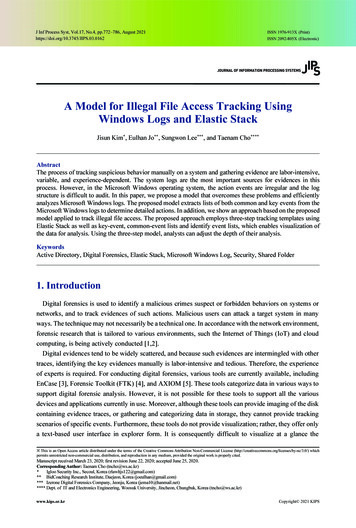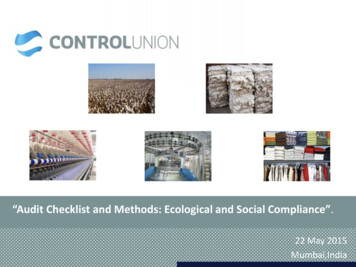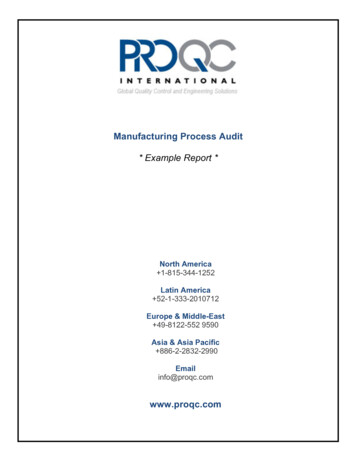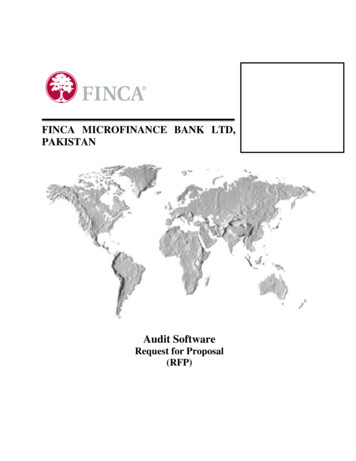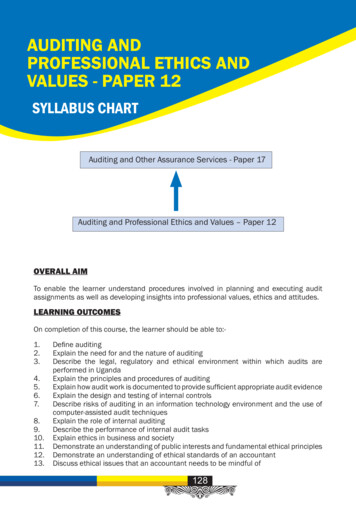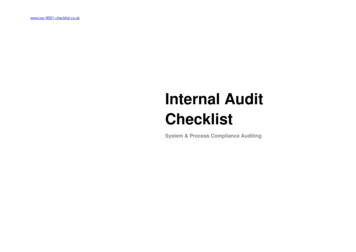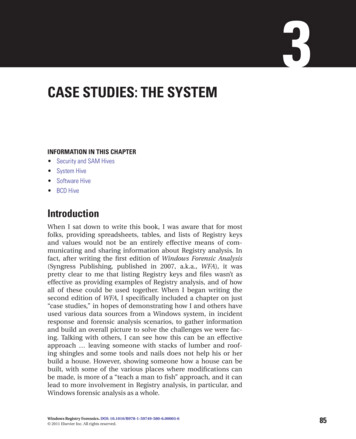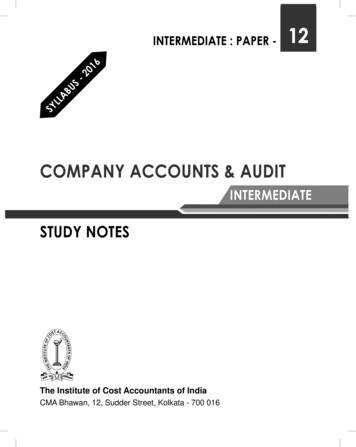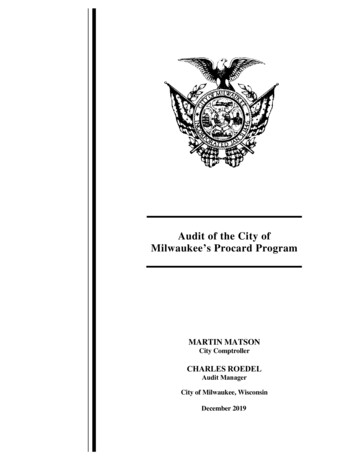
Transcription
Audit of the City ofMilwaukee’s Procard ProgramMARTIN MATSONCity ComptrollerCHARLES ROEDELAudit ManagerCity of Milwaukee, WisconsinDecember 2019
Table of ContentsTransmittal Letter . 1Report Summary and Highlights . 2I. Audit Scope, Objectives and Methodology . 3II. Organization and Fiscal Impact . 5III. Audit Conclusions and Recommendations . 7A. Internal Controls . 8Recommendation 1: Enhance policies, procedures, internal controls andprocesses governing the Procard Program . 10Recommendation 2: Formalize the process to retrieve, deactivate anddestroy the Procard of a former cardholder . 13Recommendation 3: Modify the process for temporary or permanent increaseto the daily and/or monthly transaction/spending limit . 14B. Process Review & Compliance . 15Recommendation 4: Adopt a multi-faceted approach to monitoring andoversight of Procard activities . 16Recommendation 5: Enhance training for all individuals performing Procardactivities (cardholders, Procard Managers and Approving Officials, etc.) . 18Recommendation 6: Restructure internal controls and processes forreconciliation and timely recording of journal entries in FMIS . 20C. Inventory Management and Safeguarding . 21Recommendation 7: Reinforce processes and controls for safeguarding theCity’s Procard . 22Recommendation 8: Formalize a systematic process for managing,maintaining and storing Procard-related records. 24IV. Response from the Department of Administration - Purchasing Division . 25V. Comptroller’s Acknowledgement of Receipt . 29
AUDIT REPORT HIGHLIGHTSAudit of the City of Milwaukee’s Procard ProgramOVERVIEWOBJECTIVESThe objectives of the audit were toevaluate the adequacy of internalcontrols, policies, procedures andprocesses over the City’s ProcardProgram; evaluate theappropriateness of Procard issuance,purchases, compliance withguidelines and review of purchases;and evaluate timely and accuraterecording of journal entries in theFinancial Management InformationSystem (FMIS).BACKGROUNDThe Purchasing Division is the city’scentralized buying and supplymanagement agency responsible forprocuring approximately 85 million ingoods and services annually andadministering guidelines for thedisposal of the city’s surplus, obsoleteand confiscated goods.The City of Milwaukee’s ProcurementCard Program (Procard) wasoriginally designed in 1996 andimplemented as an economicalmeans for purchasing low-value itemsin 1997. Approval was granted in2005 to use the Procard for thepurchase of equipment-funded items.Today, departments are able topurchase certain goods and servicesunder 5,000 using a Procard. TheProcard is a procurement card thatfacilitates purchases by eliminatingthe necessity for a requisition,purchase order, invoice process andthe associated paperwork through theuse of a charge card.The audit concluded that most controls in place over the PurchasingDivision’s procurement card program processes are adequatelydesigned and operating effectively to ensure only City approvedbusiness purchases are made by authorized cardholders. However,some identified controls require enhancements to ensure operationaleffectiveness and to eliminate the related exposure to risk.The report identified eight recommendations to address these issues,as summarized in the Recommendation Summary rimprovement are provided in the Audit Recommendation andConclusion section of the report).RECOMMENDATION SUMMARY1. Enhance policies, procedures, internal controls and processesgoverning the Procard Program. Enhance policy and procedure manuals describing the specificsteps, actions and processes to safeguard the use of the purchasingcard from fraudulent, improper, intentional and/or unintentionalpurchases.2. Adopt a multi-faceted approach to monitoring and oversight ofProcard activities. Streamline the monitoring/auditing process for assessingcompliance with the Procard policy and procedures.3. Reinforce processes and controls for safeguarding the City’sProcard. Risk mitigating processes and controls of inventory managementand safeguarding of City issued purchasing cards should bedocumented and reinforced (where applicable).4. Reinforce processes and controls for safeguarding the City’sProcard. Risk mitigating processes and controls of inventorymanagement and safeguarding of City issued purchasing cardsshould be documented and reinforced (where applicable).2
I. Audit Scope, Objectives and MethodologyThe audit examined the City of Milwaukee’s Procard Program administered by the Department ofAdministration, Purchasing Division. The scope of the audit included examining the adequacy ofinternal controls over Procard administration and transaction activity. The audit period was March2017 through April 2018. Specifically, All Procard payment records and transactions from March 26, 2017 through April 7,2018. All Procard applications/agreements. All Procard Managers and Approving Officials agreements. All journal entries made for Procard purchases to account 143104, March 16, 2017 throughApril 7, 2018. All City employees involved with the Procard Program administration or transactionactivity.The objectives of the audit were to:1. Evaluate the adequacy of internal controls, policies, procedures and processes over theCity’s Procard Program for: Department of Administration, Purchasing Division; and Select City of Milwaukee Departments2. Evaluate the appropriateness of Procard issuance, purchases, compliance with purchasingguidelines, and review of purchases.3. Evaluate timely and accurate recording of journal entries in the Financial ManagementSystem (FMIS).The audit was conducted in accordance with generally accepted government auditing standards.Those standards require that we plan and perform the audit to obtain sufficient, appropriateevidence to provide a reasonable basis for the findings and conclusions based on the auditobjectives. Internal Audit believes that the evidence obtained provides a reasonable basis for theaudit’s findings and conclusions based on the audit objectives.3
MethodologyThe audit’s methodology included developing an understanding of the processes and controls overthe administration and transaction activities of the City’s Procard Program. Audit procedures weredeveloped to evaluate the processes and controls necessary to meet the audit objectives andincluded process walk-throughs, inspection of relevant control documentation, and testing ofcontrols.Procedures and tests that were conducted included: Reviewed existing policies, procedures, agreements and guidelines relevant to the City ofMilwaukee’s Procard Program. Verified cardholder accounts for transferred, retired, or employee no longer employed withthe City have been closed (deactivated). Confirmed the cardholder reconciled the bank statement to the Procard Payment Recordand submitted an itemized receipt for the purchased transaction. Verified the transaction date, vendor name, and billed amount on the bank statement agreedto the transaction on the receipt. Confirmed sales tax was not included with the transaction; if sales tax was included,verified the cardholder requested and received a refund for the sales tax amount. Verified transactions to questionable vendors exhibiting characteristics of potentialfraudulent, improper and abusive purchases were authorized and for City-business. Verified transactions to weekend, holiday and year-end spending purchases exhibitingcharacteristics of potential fraudulent, improper and abusive purchases were authorizedand for City-business. Confirmed the cardholder, Procard Manager, Approving Official, or any individualperforming Procard related activities met the training requirement and signed the respectiveagreement prior to performing related activities. Verified authorized spending and transaction limits agreed to the limits identified in the JPMorgan Chase Smartdata System.4
II. Organization and Fiscal ImpactThe Department of Administration (DOA) supports the City’s mission, delivery, goals andprovides planning, policy, and management functions that assist the Mayor, Common Council andCity departments. Through these efforts, DOA supports the city’s community goals with keyfunctions that include providing analysis and recommendations on fiscal issues that affect the City,developing the annual city budget, influencing local, state and federal government policy actions,increasing grant funding, distributing grant funding to city agencies and neighborhoodorganizations, managing citywide procurement processes, supporting the growth of emerging andlocal businesses, and developing policy and programs for environmental sustainability.Inaddition, DOA is the key operating entity for the delivery of city information technology services.The Purchasing Division (Purchasing) governed by the DOA, is the city’s centralized buying andsupply management agency responsible for procuring approximately 85 million in goods andservices annually and administering guidelines for the disposal of the city’s surplus, obsolete, andconfiscated goods. The division manages the procurement process and negotiates cost savings formore than 700 requisitions received from City departments annually in a transparent, sociallyconscious, and ethical manner. 1Program OverviewThe City of Milwaukee’s Procurement Card Program (Procard) was originally designed in 1996and implemented as an economical means for purchasing low-value items in 1997. Approval wasgranted in 2005 to use the Procard for the purchase of equipment-funded items (6800 accounts).Today, departments are able to purchase certain goods and services under 5,000 using a Procard. 2The Procard is a procurement card that facilitates purchases by eliminating the necessity for arequisition, purchase order, invoice and the associated paperwork through the use of a credit card.The program is managed through a contract with JP Morgan Chase (“Chase”). Chase provides theprocurement cards, issues payment to vendors and operates a computerized information system122018 Plan and Budget Summary, City of Milwaukee. Department of Administration, Purchasing Division, pg. 31Department of Administration, Purchasing Division, Programs – Procard Program5
that provides operational and control reports to Purchasing. In addition, Chase also furnishes theCity with an annual rebate for Procard purchases based on the dollar volume of transactions. TheCity is obligated to pay JP Morgan Chase for Procard purchases within two weeks of the end ofeach biweekly billing cycle.Figure 1: Chase JP Morgan: Commercial Banking Solutions. Purchasing Card - streamline your organization’spayment process and set controls for everyday purchases - www.jpmorgan.com.Purchasing has the overall responsibility to manage the program and ensure that (1) trainingrequired for all cardholders, Procard Managers, Approving Officials and any other employeeinvolved in purchasing card activities is provided, (2) a current listing of cardholders, ProcardManagers and Approving Officials is maintained, and (3) monitoring/oversight and review isconducted. Purchasing uses administrators from City departments in a decentralized approach toassist with the administration of Procard activities. Specifically, The cardholder is the department employee to whom the purchase card, bearing theemployee’s name, is issued. The card can be used only by that employee for officialCity business, in adherence with policies and procedures. The Procard Manager is the primary point of contact for the department and has theresponsibility to approve Procard request; monitor and/or determine appropriatecardholder limits; and verifies that statements, payment records, and receipts arereconciled.6
The Approving Official (AO) reviews cardholder statements, is responsible forauthorizing cardholder purchases (for official use only), and ensures that statements,payment records, and receipts are reconciled and submitted to the Comptroller’s Office,General Accounting for payment processing.Though a written delegation of authority (application) process, an authorized individual (ProcardManager) from the department establishes a cardholder and specifies spending and transactionlimitations unique to the cardholder.Figure 2: Government Purchase Card Program 33U.S. Department of Treasury, Treasury Financial Manual, Vol. 1 – Part 4 – Chapter 4500, Government PurchaseCards, (Washington D.C.: May 2003) http://www.fms.treas.gov/tfm/vol1/v1p4c450.txt7
III. Audit Conclusions and RecommendationsThe audit assessed the adequacy and effectiveness of the controls in place over the City ofMilwaukee’s Procard Program process.These internal controls provide management withassurance that processes are performed consistently and comply with applicable statue, policy,procedures, and best practices.The audit concluded that most controls in place over the Purchasing Division’s procurement cardprogram process are adequately designed and are operating effectively to ensure only Cityapproved business purchases are made by authorized cardholders. However, some controlsidentified require enhancements to ensure operational effectiveness and to eliminate the relatedexposure to risk.This audit report identifies eight recommendations to address these issues.1. Enhance policies, procedures, internal controls and processes governing the ProcardProgram.2. Formalize the process to retrieve, deactivate and destroy the Procard of a formercardholder.3. Modify the process for temporary or permanent increase to the daily and/or monthlytransaction/spending limit.4. Adopt a multi-faceted approach to monitoring and oversight of Procard activities.5. Enhance training for all individuals performing Procard activities (cardholders, ProcardManagers and Approving Officials, etc.).6. Restructure internal controls and processes for reconciliation and timely recording ofjournal entries in FMIS.7. Reinforce processes and controls for safeguarding the City’s Procard.8. Formalize a systematic process for managing, maintaining and storing Procard-relatedrecords.8
Additional details regarding the recommendations for improvement are provided in the remainingsections of this report.A. Internal ControlsPolicies and ProceduresIn accordance with best practice, including the National Association of Purchasing CardProfessionals (NAPCP) and the 2013 COSO Framework – Principle 11: management shouldimplement control activities through policies and procedures that communicate what is expectedand in procedures that put policies into action.Points of focus: Establish a process of internal controls that is designed to provide reasonable assurance (a)that the purchase card is used efficiently, economically, effectively and legally to achievethe purpose for which the program was established and (b) in compliance with theapplicable policies and procedures. Develop a portfolio of internal controls which are appropriate to safeguard City resourcesand manage against risk associated with the use of the City’s purchasing card (Procard)within the department, and protected from malicious intent (e.g., fictitious transactions,unauthorized purchases).Comprehensive written, documented policies and procedures should be developed to maintainappropriate controls, in accordance with the requirements of the purchasing card program: madeaccessible and communicated to all personnel; and reviewed and updated as needed. Thoroughpolicies, procedures and processes establish management’s criteria for executing City operations,outline current requirements interdependencies, risks and controls, and they can help to identifyimprovement opportunities as well as serve as an effective training tool for staff and faculty.Documented policies and procedures provide oversight into standardized functions, key risks andcontrols that need to be monitored, simplify risk assessments, risk mitigation and audit efforts.Policies and procedures governing the procurement card program are inadequate and lack the9
specific steps, actions and processes to safeguard the use of the purchasing card from fraudulent,improper, intentional and/or unintentional purchases.Audit testing indicated that policies, procedures, internal controls and processes governing theProcard Program should be enhanced to include specific steps, actions and processes to safeguardthe Procard from Procard from fraudulent, improper, intentional and/or unintentional purchases.Specifically, Inadequate policies and procedures governing the use of the City’s purchasing card. Lack of documentation/inadequate documentation of purchases. Inconsistent purchasing card practices within individual departments and cardholders. Approving Officials have statements in excess of 10 at a time to review. Procard is linked to cardholder personal Amazon account. City departments share an Office Depot purchasing card; however, one department hasan employee making purchases, but has not been through the application approvalprocess, or training. In addition, although the department head has previously beenthrough training, she has not been designed as the Approving Official, but is signing assuch and in her absence a member of the Board of Directors signs. There is one department that has three employees where the department head is theProcard Manager and the Approving Official and one employee who is the cardholder.In the absence of the cardholder, the department head would be signing as thecardholder, the Procard Manager and the Approving Official.Recommendation 1: Enhance policies, procedures, internal controls and processes governingthe Procard Program.To improve the level of controls over the City’s Procard Program, management should enhancepolicy and procedures describing the specific steps, actions and processes to safeguard the use ofthe Procard from fraudulent, improper, intentional and/or unintentional purchases.10
Specifically, Instructions on employee responsibility and written acknowledgements signed by theemployee. Ongoing training of cardholders, Procard Manager and Approving Officials. Spending and transaction limits for each cardholder both single and monthly. Written request for higher spending limits. Recordkeeping requirements, including review and approval processes. Clear guidelines on the appropriate use of the purchasing card, including approved andunapproved Merchant Category Codes (MCC). Guidelines for making purchases by telephone and fax, or over the Internet. Periodic audits for card activity and retention of sales receipts and documentation ofpurchases. Timely reconciliation by cardholders, Procard Managers and Approving Officials. Procedures for handling disputes and unauthorized purchases. Procedures for card issuance, destruction, cancellation, lost or stolen cards, and employeetermination. Segregation of duties for payment approvals, accounting and reconciliations. Regular review of spending per vendor and merchant category codes. Require City departments to develop and document internal control procedures consistentwith the City’s Procard Program policies and procedures. Where it is determined that departmental internal controls are inadequate, the ProcardAdministrator have the authority to request improvements and/or place Procardrestrictions on the department until such controls are established, documented andimplemented. Inclusion of special conditions (such as travel, congratulatory & condolences flowers,meal purchases, etc.) with specific requirements listed next to each item listed. If thespecific conditions are not met or the approvals are obtained after the purchase was made,the purchase may be considered unauthorized and the cardholder will be required to returnall items or reimburse the City for the purchase. A comprehensive list of items, goods, or services prohibited for Procard purchases(cardholder with special need, should obtain authorization prior to purchase).11
Ensure that rebates from the bank are promptly deposited into the City’s account; includebackground of the rebate, where and what monies are allocated for. Ensure refunds from vendors are promptly placed back on the respective card for thespecific cardholder.While the Purchasing Division has a Procard training guide, for regular and travel purchasingauthority, that is distributed during training it is not well-defined or comprehensive to programrequirements and Procard users are unclear on their specific program roles, responsibilities andrequirements.In addition, both citywide and departmental Procard policies and procedures should be stored in acentralized location that is easily accessible and should be updated as needed.Cardholder AccountIn accordance with best practice requirements, if a cardholder retires, transfers to another divisionor department, or terminates employment, the Procard Program Administrator should be notifiedimmediately and the purchasing card should be returned for cancellation and destruction. Ifdeemed necessary for the cardholder to obtain a new purchasing card for his/her new division ordepartment, the Procard Manager should complete a new request form.Testing results concluded that the Purchasing Division does not have a formal process to notifythe Procard Program Administrator to retrieve, deactivate and destroy the Procard of a formercardholder. In addition, the Procard for some retired, transferred, suspended or former Cityemployee accounts have remained active in the JP Morgan Chase Smartdata database from 365 to1,825 days.Specifically, Review of Procard cardholders who transferred to another department, retired, resigned,or terminated employee identified accounts in an active status for an employee who hadbeen retired for at least a year or more.12
Cardholders whose employee record in the City’s Human Resource Management System(HRMS) had been in a suspended status for 5 years or more; however, the Procard accountis still active in the JP Morgan Chase Smartdata database. Cardholders who had been in a suspended status for 5 years or longer, and have recentlyretired, still have an active Procard account status.Recommendation 2: Formalize the process to retrieve, deactivate and destroy the Procard ofa former cardholder.Management should formalize the process to ensure a cardholder account for an employee whoretired, suspended, transferred, or terminated employment with the City are closed in the JPMorgan Chase Smartdata database.To accomplish this, the Procard Program Administrator should: Work with JP Morgan Chase MasterCard to establish internal controls to decline futurepayments after the date the cardholder is no longer performing cardholder activities. Require the Approving Official to notify them in writing of an employee who no longerneeds access to the Procard. Require the Approving Official to return the physical card to the Procard Administrator forproper destruction. Require the Approving Official to perform the last reconciliation of the MasterCardstatement and notify the Procard Administration upon completion of the reconciliation. Confirm the name of the cardholder and the date in which the Procard was returned. Boththe card and form should be return to the Procard Program Administrator. The ProcardProgram Administrator should sign and date the form confirming receipt, destruction anddeactivation of the card.Transaction/Spending LimitIn accordance with purchasing card control standards, the purchasing card and any transactionmade with the card may become a liability of the government entity. For this reason, it is important13
that governments be aware of the risks related to the use of purchasing cards and establish controlsto address those risks. Governments need to maintain appropriate controls in accordance withtheir purchasing card policy to ensure the ongoing success of a purchasing card program. Suchcontrols should include comprehensive control restrictions for single transactions, the number andamounts authorized per day and per cycle.Audit testing indicated that there is no formal or documented process to request a temporary orpermanent increase to spending limits: Review of cardholder weekend/year-end purchases revealed a payment voucher, bankstatement, Procard Payment Record, or itemized receipt could not be located for purchasetransaction sampled items selected for review. Sales tax was included on the receipt for cardholders with no documentation to support arefund had been requested or that a refund was received. There was no documentation to support transactions that exceeded daily transactionlimitation and there was no documentation to support the request was authorized by theApproving Official. Documentation for declined transactions exceeding the transaction limitation, for bothclosed and active account.Recommendation 3: Modify the process for temporary or permanent increase to the dailyand/or monthly spending limit.Management should modify the process for temporary or permanent increase to the daily and/ormonthly transaction limit and the daily and/or monthly spending limit.Consideration should include: Develop a spending limit increase form (the form should include the name of cardholder,spending limit increase, whether it is temporary or permanent increase, the date the requestwas made, the signature of both Procard Manager and Approving Official, the date thelimit should be returned to its original limit, if temporary, etc.) Once approved, the spending limit request form should be maintained in the cardholder’sfile.14
If a purchase is declined, documentation indicating a purchase was declined should beplaced in the cardholder file, e-mail the cardholder, cc the Procard Manager / ApprovingOfficial of the declined purchase with a recommendation to request a spending limit formsfor required, necessary purchases.B. Process Review & ComplianceIn accordance with best practice requirements, including the National Association of PurchasingCard Professionals: management should consider the potential for fraud when identifying,analyzing and responding to risks. Monitoring purchasing card activities can provide uniqueinsight as to which approaches are working and which present challenges. Monthly, or periodicpurchase transaction monitoring not only validate program performance indicators, but canuncover new expense categories, suppliers or locations to target. A continuous review ensures thatthe program never stagnates. Monitoring identifies intentional deviations, such as when anemployee purposely seeks to stray from a defined process for his or her own benefit. Reviewinga process for compliance helps management to affect changes when an activity does not meet oris at risk of not meeting its intended results. This step is pivotal in process management. Perreferenced best practice requirements, including the 2013 COSO Framework-Principle 10:management should select and develop control activities that contribute to the mitigation of risksto the achievement of objectives.Points of focus: Control activities can include a range and variety of controls, including both manual andsystem automated controls, and preventive and detective controls. Attributes contributing to the effective design and implementation of controls: Purpose - a control activity that prevents or detects issues is more precise than one thatidentifies and explains differences. Aggregation - control activities performed at a more granular level are more precisethan one performed at a higher level.15
Consistency - control activities performed routinely and consistently are generallymore precise than those performed inconsistently.Monitoring and OversightAudit results identified an opportunity for management to redefine monitoring and oversight ofProcard activities. The Purchasing Division does not consistently perform monitoring/auditing of Procardactivities. A payment voucher, bank statement, Procard Payment Record, or itemized receipt wereunable to be located in e-vault for six (6) samples selected for review. Discussions with cardholders, Procard Managers and Approving Officials revealed thatduplicate Procard payments were made by check. The Purchasing Division does not have a process in place requiring departments toimplement process improvements consistent with requirements of the program; or to placerestrictions on departments (and cardholders) until controls are established, documentedand implemented. Departments heads are performing Procard activities as the Procard Manager, and/orApproving Official without completing the application process, the Procard Manager/Approving Official agreement form, Procard training, and without the knowledge of theProcard Administrator. The Procard Administrator does not send annual communication requesting an update ofany changes to departmental Procard Managers and Approving Officials.Recommendation 4: Adopt a multi-faceted approach to monitorin
Card Program (Procard) was originally designed in 1996 and . Chase JP Morgan: Commercial Banking Solutions. Purchasing Card - streamline your organization's payment process and set controls for everyday purchases - www.jpmorgan.com. Purchasing has the overall responsibility to manage the program and ensure that (1) training .


